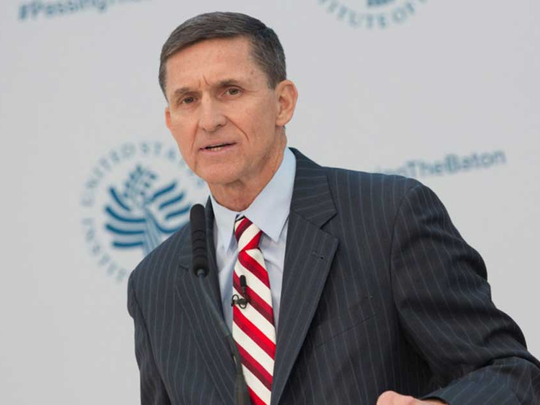
US President Donald Trump is filling the government’s national security leadership with former military officials and businessmen, rejecting the policy and academic types both parties have traditionally relied on. But the militarisation of the Trump foreign policy team is even more concentrated on the White House staff led by National Security Adviser Michael T. Flynn — and it has observers both inside and outside the administration concerned.
Flynn, a retired lieutenant-general, is steadily assembling the most military-heavy National Security Council staff of the modern era. His effort stems from two motivations, according to several transition officials. First, he wants people he knows and trusts. More broadly, Flynn believes that the Obama administration’s NSC staff had a dearth of real war-fighting experience, resulting in bad policy decisions and poor follow-through, especially when combating terrorist groups abroad.
“We’re going to have people who have looked down a rifle scope,” Flynn often said at meetings during the transition, according to one senior transition official.
Next week, Vice-President Mike Pence will announce personal national security adviser Andrea Thompson, a career Army intelligence officer who retired in October after 28 years of service, transition officials said. Thompson served multiple tours overseas, worked as a fellow for two congressional committees and most recently worked at the consulting firm led by retired General Stanley McChrystal.
Transition officials told me that Dave Horan, another career Army officer, will be a senior National Security Council official dealing with strategy. Former Marine intelligence officer Robin Townley will be senior director for Africa. Former Marine intelligence officer Matt Pottinger will be senior director for Asia. In December, it was announced that retired Lt-Gen Keith Kellogg will be NSC chief of staff.
All of these staffers not only share careers in uniform, in and out of war zones, but they also all have personal connections with Flynn. One transition official told me that Flynn is surrounding himself with people he is comfortable with, “his battle buddies.”
Flynn also believes that he must course-correct from an Obama NSC staff he thinks was filled with wonky D.C. types who only knew about war from reading reports, according to transition officials involved in the discussions. Flynn believes if you fill the NSC staff with people who have “borne the battle,” as he likes to say, you will get better outcomes. The risk of that approach? When the only tools you have are hammers, every problem looks like a nail.
“It is a group of people who are operators. There are very few strategic people,” said the official, who was not authorised to talk about internal deliberations. “You had one extreme with Obama, and now Flynn is going to the other extreme. There’s a middle ground.”
Strategic weakness
All of the NSC staffers Flynn has appointed have distinguished resumes, have served honourably and are praised by former colleagues as able and patriotic public servants. The concern over Flynn’s appointments rests not in the people he is choosing but in the overall balance within the team.
Military officers bring knowledge, discipline and a keen organisational and planning mentality to problems, said Kori Schake, who wrote a book on civil-military relations with Defence Secretary James N. Mattis, also a retired general. But their strategic weakness is that they often shun the political dynamics of national security problems, which are crucial at the highest levels of policy.
“The president needs a White House staff that is ambidextrous, able to work both realms,” Schake said. “Obama was poorly served by having staff that didn’t understand the military demands. Trump’s, if it is predominantly military, will struggle to swim effectively in political currents.”
That could be an issue not only when dealing with outside interlocutors such as Congress and foreign governments. Inside Trump world, the competition for control and influence on foreign policy is already bruising, and highly political.
Not all of the NSC appointments have been fresh-off-the-battlefield military officers. Fox News analyst K.T. McFarland is deputy national security adviser. Fox News analyst Monica Crowley was set to be the NSC’s strategic communications chief until she withdrew amid allegations of serial plagiarism. Fox News analyst Sebastian Gorka, a civilian military expert, is helping Flynn with counterterrorism.
Flynn is under pressure to show Trump he can make relatively quick progress in the struggle against terrorism, especially in Iraq and Syria. That’s the straightest line for Flynn to establish himself as indispensable with a new president who has set up a team of rivals. To succeed in the long run, however, Flynn and Trump will need to assemble an NSC staff with diverse backgrounds that can approach problems not only from a military lens.
— Washington Post
Josh Rogin is a columnist for the Global Opinions section of The Washington Post.










